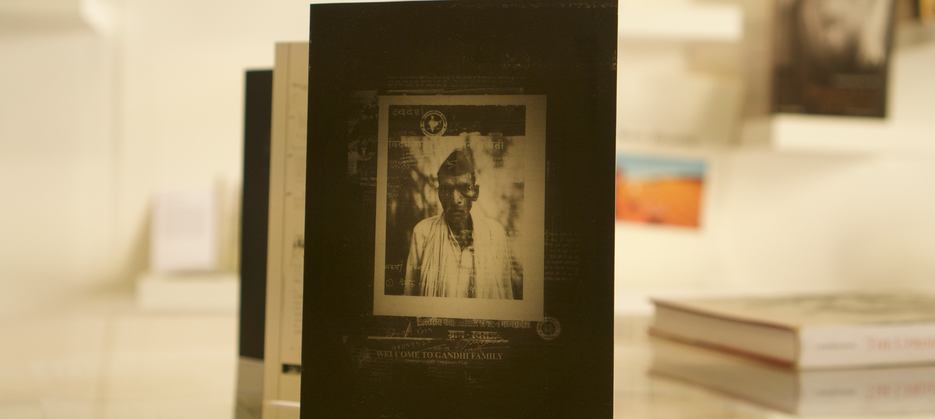Kaghazi Pairahan: Publishing and Resistance in South Asia
DoubleDummy, Arles, July 2023
Supported by Arthshila
The exhibition, hosted during the Rencontres d’Arles 2023 was curated by Akshay Mahajan and Devadeep Gupta and produced by JOJO. The exhibition was designed by Adira Thekkuvettil.
Kaghazi Pairahan* or Clothes made of Paper, weaves captivating stories and histories of resistance from South Asia, showcasing a wide range of historical material that sheds light on struggles against oppression and the fight for liberation. From the Indian uprising of 1857 to the present day, this exhibition encapsulates the spirit of defiance and resilience in the face of colonialism and social injustice in South Asia.Visitors can find a library of photobooks, dummies, artist books, zines, posters, digital publications, and pamphlets—an exhibition of an archive of everyday defiance intended for reading and disseminating alternative, progressive, and autonomous viewpoints, often as a form of artistic protest in Pakistan, India, Kashmir, Nepal, Sri Lanka, and Bangladesh. Visitors can expect to embark on a captivating journey through diverse narratives. The exhibition deals with the challenges of publication and circulation of images as they are re-contextualized, archived, disguised, and circulated in response to the prevailing status quo. Each piece offers a unique perspective on the complex testimonies of stateless nations, disenfranchised individuals, and victims of state violence. A new edition of our newspaper will be published for the occasion : "Margin Notes : self-publishing as counter-strategy" by Tanvi Mishra.
As a commemoration of the 50th anniversary of the Chilean coup, a Global South solidarity day is planned in Thursday 6th, with a pop-up exhibition of contemporary Latin American protest books from artists like Celeste Rojas Mugica, Musuk Nolte, Federico Paladino, Luis Weinstein, Alexis Díaz Belmar, Alejandro Cartagena, Bruno Barbey, Pedro de Moraes, Rosângela Rennó, Rosa Gauditano, Santiago Escobar Jaramillo among others... organized by Zur, a research unit within Doubledummy dedicated to artistic research that aims to interrogate the photographic practices currently taking place in the Souths coordinated by Alejandro Léon Cannock.
Monday to Friday, 11h : Guided tours at the exhibition
Wednesday 5th July, 13h : Global South Protest talk at Podesta!
Wednesday 5th July, 19h : Vernissage at Double Dummy
Thursday 6th July, (all day) : Latin American Solidarity Day
Saturday 8th July, 15pm : A conversation between Dr. Shahidul Alam and Bill Shipsey at Podesta!
Thanks to Arthshila & Libraire du Palais.
The exhibition will travel across Arthshila centres in India in 2024.
Download the free essay Margin Notes: Self-publishing as counter-strategy by Tanvi Mishra: https://www.editionsjojo.com/product-page/margin-notes-self-publishing-as-counter-strategy
More about the exhibtion:
https://asapconnect.in/post/602/singleevents/subtle-archives-and-subversions
https://www.asapconnect.in/post/603/singleevents/circuits-of-making
'Things I Can't Say Out Loud' by Riti Sengupta at the Louis Roederer Discovery Award at Les Rencontres d'Arles 2023. Curated by Tanvi Mishra, produced by JOJO
with the support of VII Foundation & Atelier Boba
After eight years of living apart, Riti Sengupta moved in with her parents at the onset of the pandemic. Upon her return, she was confronted by the ease with which her family’s dynamic was animated by patriarchal structures, articulated through everyday domesticities. Things I Can’t Say Out Loud is an intergenerational dialogue between the artist and her mother, through which they excavate their identities as women within the family home.
In reckoning with the convenient acceptance of her mother’s position within their home, Sengupta began what she calls “kitchen conversations.” She combed through the family archive with her mother, and listened to stories of women who had come before her. The contrast between the lives they led before they became mothers and wives, and after, was stark ‒ Sengupta saw how her own mother’s personhood was diminished under the weight of household expectations. Despite being a record of time, the archive never revealed this dichotomy. Why are family albums so often excluding these aspects of domesticity?
Propelled by this absence, Sengupta attempts to give shape to the intangible oppressions that live in the interstices of the everyday realities of women. Patriarchy exists here in subtle gestures of the everyday ‒ in the domestic load that is imposed on them as wives, mothers, and daughters or in the desire to romanticize the role of the woman as the unconditional giver. The myth of the middle-class idyllic family setup rests on the invisibilization of many kinds of labor. It is in the service of this erasure that she is expected to exercise constraint at all times. The conversations between mother and daughter turn into collaborative performances, through which both women reflect on their own realities. Using a language that is buoyant, they respond to the larger politics of family, marriage, and the domestic household.
Tanvi Mishra
Riti Sengupta received a special mention for the Madame Figaro Award at Les Recontres d'Arles 2023
More about the exhibition: https://www.rencontres-arles.com/en/expositions/view/1480/riti-sengupta




















